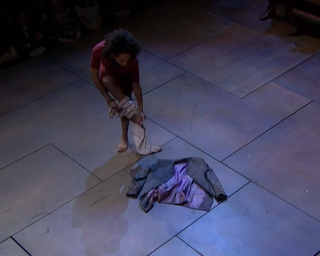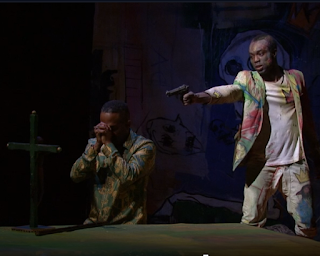Act III, scene iii: Bow, stubborn knees
Rosencrantz and Gildenstern enter with the King, who confirms his decision to send Hamlet to England with them.
It is framed as a protective measure: it would be dangerous 'To let his madness range' (III.iii.2) and it will not do for the King's safety to be compromised, since the fortune of the king determines that of his subjects.
This belief is acknowledged by Rosencrantz 'Never alone/Did the King sigh, but with a general moan' (III.iii.22-23), but as ever, dramatic irony is at play here. The divine right theory of kingship (which asserted that kings derived their authority from God, and supported the idea of hereditary monarchy) and Chain of Being (a Christian concept codifying the religious hierarchical structure of all life and matter) have been disrupted. Both were significant ideas in terms of Elizabethan philosophy and ideas about World Order; Claudius is a usurper, not a rightful ruler.
It is framed as a protective measure: it would be dangerous 'To let his madness range' (III.iii.2) and it will not do for the King's safety to be compromised, since the fortune of the king determines that of his subjects.
This belief is acknowledged by Rosencrantz 'Never alone/Did the King sigh, but with a general moan' (III.iii.22-23), but as ever, dramatic irony is at play here. The divine right theory of kingship (which asserted that kings derived their authority from God, and supported the idea of hereditary monarchy) and Chain of Being (a Christian concept codifying the religious hierarchical structure of all life and matter) have been disrupted. Both were significant ideas in terms of Elizabethan philosophy and ideas about World Order; Claudius is a usurper, not a rightful ruler.
Next, Polonius enters, reiterating his intention to 'convey' himself (III.iii.29) behind another arras. His entrance reinforces the sense of action that has dominated this act, though his exit leaves Claudius alone on stage.
It is further dramatic irony that the tragic hero arrives at exactly this juncture. The stage direction He kneels is followed immediately by Enter Hamlet.
When we left Hamlet in the previous scene it was 'Now' at the very moment when he could 'drink hot blood/And do such bitter business as the day/Would quake to look on'( III.iii.381-383), enraged in the knowledge that Claudius is guilty. And here is his chance to do that bitter business. He draws his sword.
But the indecisive prince finds that this opportunity to avenge his father's murder by killing the murderer, is but 'hire and salary, not revenge' (III.iii.79). To slay the king in the very act of prayer, or the 'purging of his soul' (III.iii.85) might offer Claudius some hope of salvation and redemption, which is untenable for Hamlet. Why should Claudius be entitled to it, when Hamlet's father was denied the possibility? The old king was instead,
'Cut off even in the blossoms of my sin,
Unhousel'd disappointed, unansel'd,
No reckoning made, but sent to my account
With all my imperfections on my head!' (I.v.76-79)
Decisive action is therefore delayed once more, even though, in Claudius' reaction to the players in the previous scene, Hamlet has indeed found the proof that he has sought since first encountering the Ghost.
And provides, of course, another helping of dramatic irony - since Claudius wasn't, in fact, praying at all.
One of my favourite Hamlet study resources is The Hamlet podcast, by Conor Hanratty. Give it a try for Act III, scene iii and the first part of Claudius' soliloquy. Then try summarising both Claudius' and Hamlet's thoughts in their respective soliloquies in this scene.





Comments
Post a Comment